12 steps to overcome Internet addiction
Table of content
- 1. Acknowledge the addiction
- 2. Consider professional help
- 3. Create a schedule
- 4. Practice mindfulness
- 5. Set device-free times
- 6. Identify triggers
- 7. Seek support
- 8. Find alternative activities
- 9. Use productivity tools
- 10. Limit social media
- 11. Create technology-free zones
- 12. Set goals
- What is internet addiction?
- What are the facts about internet addiction?
- What are the therapies used to overcome internet addiction in teens?
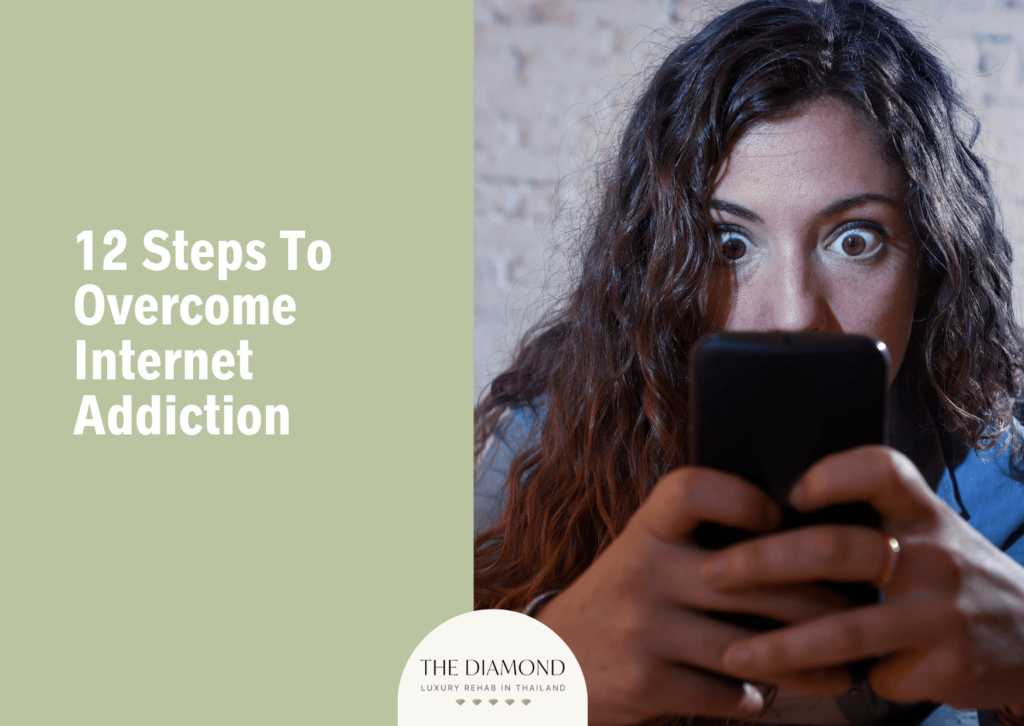
Internet addiction refers to a problem that occurs when someone spends way too much time using the internet. This excessive internet use can start to cause issues in different aspects of an individual’s life. For example, they might neglect their schoolwork, job, or spending time with friends and family because they’re always on the internet.
The causes of internet addiction include genetics, structural brain changes, environmental factors, and underlying mental health conditions.
There are five types of internet addiction, namely cybersex addiction, net compulsions, cyber (online) relationship addiction, compulsive information seeking, and computer or gaming addiction.
The signs of internet addiction include spending more time online than intended or planned, neglecting other aspects of life, lying or hiding the extent of internet use, intense concern about what is going on online when you are not present, aches and pains from inactivity, unintended weight loss or gain, withdrawal symptoms from not spending enough time online, sleep disturbances, and unsuccessful attempts to limit or stop internet use.
This article provides a practical and effective 12-step approach to guide individuals on how to break internet addiction. From recognizing the signs to implementing healthy habits and seeking support, readers will discover actionable strategies to regain control over their internet use and restore balance in their lives.
1. Acknowledge the addiction
Acknowledging the addiction means admitting to yourself and others that you have a problem with internet use and that it is affecting your life negatively. It also means being willing to make changes to overcome the addiction.
Acknowledging problematic internet use can help an individual overcome internet addiction by helping them break the denial and rationalization that may keep them stuck in the addictive cycle of internet use.
This particular way of how to stop using the internet can also assist someone in accepting the reality of their situation and how it has affected them.
2. Consider professional help
Considering professional help means being open to the possibility of seeking assistance from a qualified therapist or other mental health professional who is trained in treating internet addiction.
Professional help can help overcome internet addiction by addressing any underlying issues that may contribute to internet addiction, such as depression, anxiety, or low self-esteem.
A 2022 article titled, “3 Tips to Help Someone With an Internet Addiction” from GoodRx Health adds that professional help is the best internet addiction solution in the long run. Often, the goal of treatment is to find ways to help the person use the internet in a more balanced way and get back to normal amounts of use.
3. Create a schedule
One of the ways how to break internet addiction is to create a schedule. Creating a schedule refers to planning and organizing your time in advance so that you can balance your internet use with other activities and responsibilities.
It can help resolve problematic internet use by helping you set clear and realistic goals for reducing your internet use, so you can prioritize the most important or urgent tasks that need your attention.
4. Practice mindfulness
Another solution to internet addiction is to practice mindfulness. Practicing mindfulness means paying attention to the present moment with curiosity and openness, without judgment or distraction.
According to a 2019 study by Woo Jin Song and Jae Woo Park published in the International Journal of Mental Health and Addiction, mindfulness and self-control partially moderate the association between stress and online addiction, which means they can minimize the influence of stress on internet addiction.
Moreover, mindfulness can help you stop being addicted to the internet by making you more aware of your thoughts, feelings, and bodily experiences that may trigger you to use the internet.
5. Set device-free times
Setting device-free times refers to choosing certain periods of the day or week when you do not use any tech devices, such as smartphones, computers, tablets, or televisions.
It is considered one of the solutions for internet addiction because aside from helping you break the habit of constantly checking your devices and feeling anxious about missing out, device-free times can also improve your sleep quality and quantity by avoiding blue light and stimulation before bedtime.
6. Identify triggers
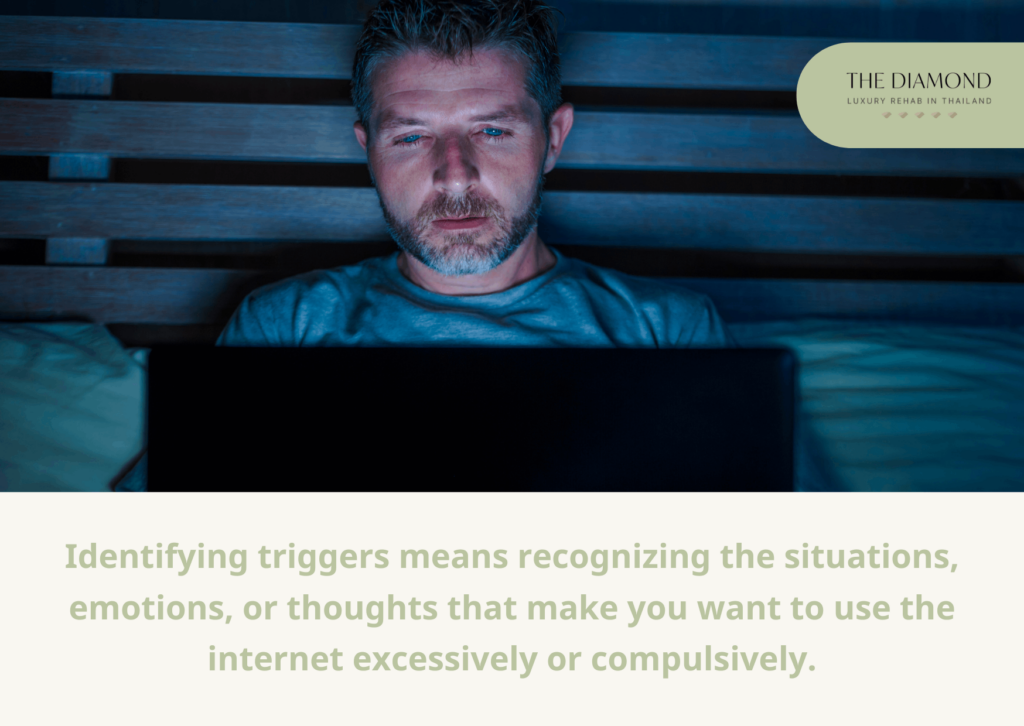
Identifying triggers means recognizing the situations, emotions, or thoughts that make you want to use the internet excessively or compulsively.
Identifying triggers might help you overcome internet addiction by increasing your awareness of your online usage habits and the reasons for them. It can also aid in avoiding or better coping with the triggers in question.
7. Seek support
Seeking support means reaching out to friends, family, support groups, or professionals for help and encouragement in dealing with internet addiction. It involves sharing one’s struggles and challenges related to excessive internet use, and actively seeking guidance, understanding, and assistance from others during the recovery process.
Seeking support can be highly beneficial in overcoming internet addiction because it helps the afflicted person feel less alone and isolated in their struggle. Having social support also helps them gain new perspectives and insights from people who understand their situation.
8. Find alternative activities
To find alternative activities means to engage in other hobbies, interests, or tasks that can provide you with enjoyment, fulfillment, or relaxation without using the internet.
It can help you break your online habit by getting you involved in activities that provide the same or similar satisfaction, creativity, or education without requiring access to the internet.
Furthermore, according to a 2022 article titled, “How to Avoid Internet Addiction” from wikiHow, some healthy alternatives to using the internet are working out, reading a book, writing, learning, knitting, and doing crossword puzzles.
9. Use productivity tools
Using productivity tools means using special apps, software, or devices that can help a person with the problems related to their internet use. These tools can help them stay organized, manage their time better, or even limit how much time they spend on the internet.
Productivity tools can help overcome internet addiction by helping you track and monitor your internet use and identify patterns or problems. Certain productivity tools, such as RescueTime and Freedom, can also block or limit access to distracting websites or apps, reducing the temptation to engage in excessive internet use.
10. Limit social media
Limiting social media describes the practice of intentionally reducing the amount of time and frequency of engagement with social media platforms, such as Facebook, Twitter, Instagram, and others.
It can prevent problematic internet usage by setting boundaries to prevent excessive use and potential addiction to social media platforms. By reducing social media use, one can break the habit of constantly checking or scrolling through social media feeds.
As a result, they can also avoid the potential negative effects of social media on their mood, self-esteem, or body image.
11. Create technology-free zones
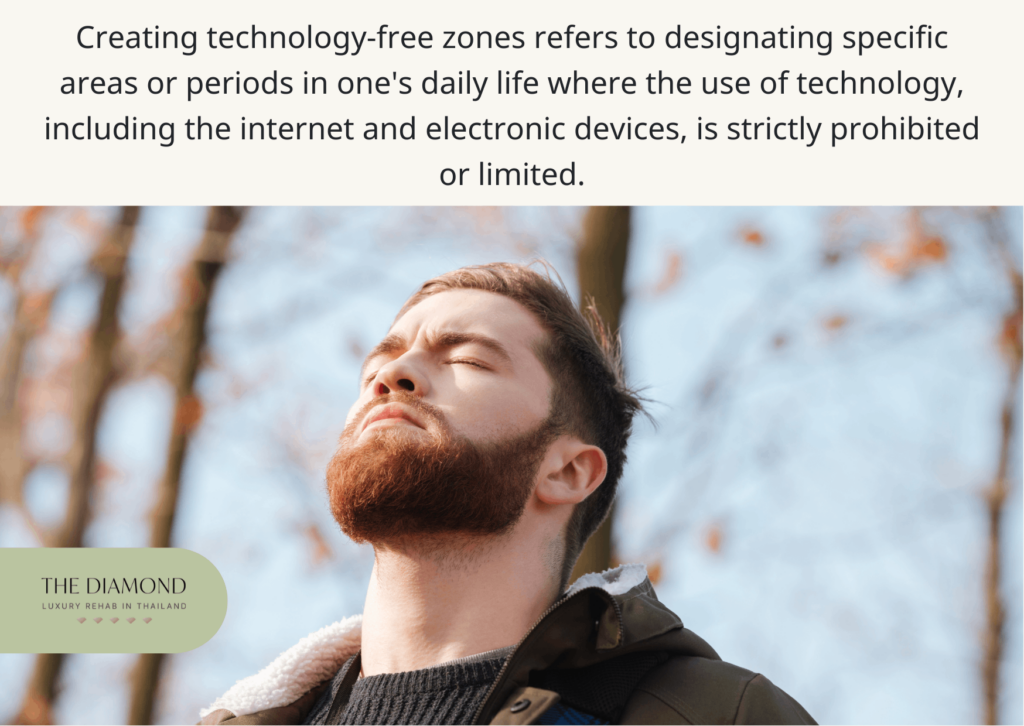
Creating technology-free zones refers to designating specific areas or periods in one’s daily life where the use of technology, including the internet and electronic devices, is strictly prohibited or limited.
These zones can be physical spaces, such as a bedroom or dining area, or specific time periods, like during meals or before bedtime, where individuals intentionally disconnect from technology.
Designating certain areas or times as technology-free zones sets clear boundaries between the digital world and real-life interactions, helping individuals disengage from the constant pull of the internet.
12. Set goals
Setting goals means establishing specific, measurable, and achievable targets that individuals aim to accomplish within a defined period. In the context of overcoming internet addiction, setting goals involves identifying clear objectives related to reducing internet use, managing time effectively, and establishing a healthier relationship with technology.
Establishing realistic goals can be beneficial for people with internet addiction because it can help them clarify their vision and direction for their recovery process. It also lets them monitor their own progress and evaluate their results.
What is internet addiction?
Internet addiction, which is also called problematic internet use or internet dependency, is a behavioral condition marked by excessive, compulsive, or out-of-control use of the internet that causes problems in many areas of a person’s life.
Internet addiction is characterized by an uncontrollable desire to be online, to the point where internet activities dominate and undermine daily routines, social connections, professional or academic performance, and even physical health.
What are the facts about internet addiction?
The facts about internet addiction mostly involve statistics from surveys conducted by experts. The facts about internet addiction are listed below.
- Internet addiction is a global concern: A 2022 internet addiction test published in Psycom.net states that according to most prevalence research, internet addiction affects between 1% and 10% of the population. Researchers in Asia, on the other hand, have discovered rates as high as 25%.
- Tech breaks are difficult for 44% of teens: A survey conducted by global research experts GfK found that teenagers (15–19 years old) are the most likely to battle with technology addiction, with 44% admitting they find it hard to take a digital break even when they know they should.
- Smartphones cause a quarter of US traffic accidents: A 2020 article titled, “109 TECHNOLOGY ADDICTION STATISTICS: 2020/2021 DATA, FACTS & INSIGHTS” from CompareCamp states that smartphone use accounts for 26% of all car accidents in the United States.
- Average daily time spent online: A 2023 article titled, “Screen Time Statistics: Average Screen Time in US vs. the rest of the world” published in Comparitech states that the average person spends 6 hours and 37 minutes a day (for internet-related tasks) looking at a screen. This includes looking through social media for 2 hours and 31 minutes, streaming music for 1 hour and 38 minutes, and listening to podcasts for 1 hour and 12 minutes. Moreover, 3 hours and 46 minutes of this time is spent on cell phones.
- Internet addiction is not in the DSM-5: Internet addiction is not recognized as a diagnosable condition by the American Psychological Association’s psychiatry text, the Diagnostic and Statistical Manual of Mental Disorders (DSM-5). However, an article on internet addiction from Psychology Today states that the DSM-5 does recognize internet gaming disorder as a condition worthy of further investigation.
What are the signs of internet addiction?
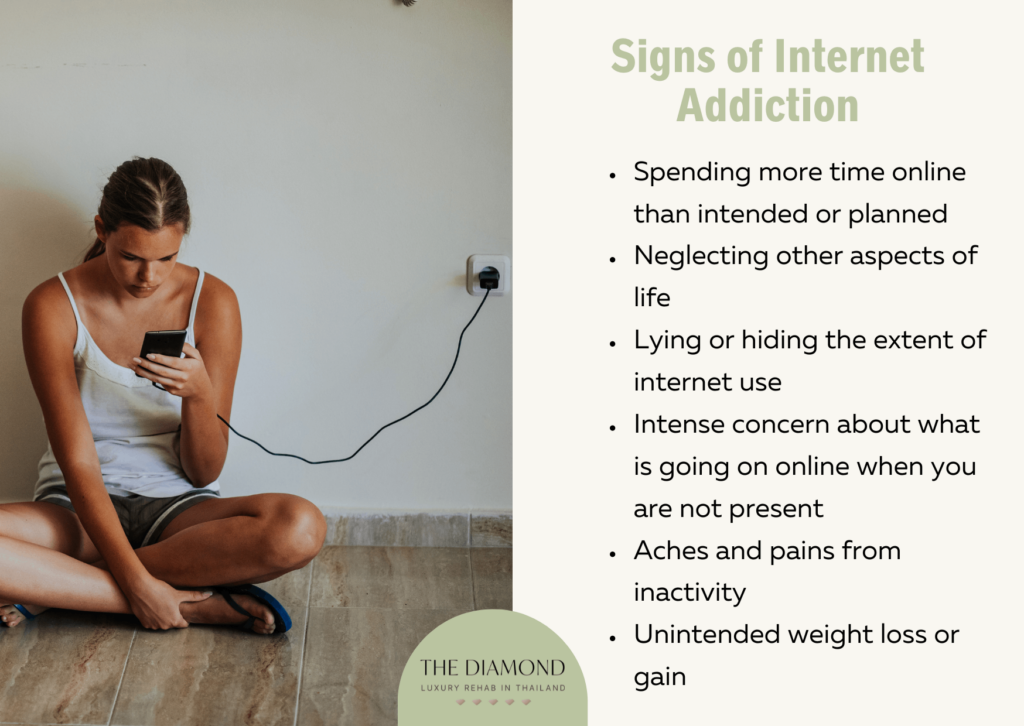
The signs of internet addiction may manifest in physical, mental, or behavioral ways. The signs of internet addiction are listed below.
- Spending more time online than intended or planned: Spending more time in front of a screen than originally planned may indicate loss of control over internet use and difficulty in setting boundaries.
- Neglecting other aspects of life: According to an article titled, “Internet Addiction: The Dangers And Negative Effects” from MantraCare, as an addict spends more time online, he or she may forget important deadlines, miss out on quality time with loved ones, lose interest in hobbies, perform poorly at school or work, and face health problems.
- Lying or hiding the extent of internet use: One of the possible symptoms of internet addiction, which indicates that the teen is aware of their excessive or harmful internet use, but is unable or unwilling to stop or reduce it. It also suggests that they fear the consequences or reactions of their parents, teachers, or friends if they find out how much time they spend online.
- Intense concern about what is going on online when you are not present: A teenager with internet addiction may develop an unhealthy attachment or obsession with the online world, and may feel anxious or restless when they are offline. This also suggests that they have difficulty coping with reality and managing their emotions without the Internet.
- Aches and pains from inactivity: Aches and pains from inactivity can become a symptom of internet addiction when individuals spend excessive amounts of time using electronic devices and engaging in online activities, leading to a sedentary lifestyle. People have to be mindful of the aches and pains that come from inactivity when trying to overcome internet addiction. Encourage regular screen breaks, include physical activity in daily activities, and limit internet use to avoid the harmful impacts of inactivity.
- Unintended weight loss or gain: Someone may either eat too much or too little as a result of their excessive or compulsive internet use. They may also be skipping meals, binge eating, or purging to cope with their emotions or stress. Unintended weight loss or gain resulting from internet addiction can exacerbate feelings of anxiety, depression, or low self-esteem, especially if teenagers are dissatisfied with their changing body image.
- Withdrawal symptoms from not spending enough time online: Individuals may experience physical and psychological discomfort or distress when they are unable to access the internet or engage in online activities. These symptoms are indicative of a dependency on the internet and a compulsive need to be online.
- Sleep disturbances: Sleep disturbances become a symptom of internet addiction when individuals prioritize online activities over proper sleep hygiene, leading to disruptions in their sleep patterns. Sleep deprivation resulting from internet addiction can negatively impact teenagers’ cognitive functioning and memory, affecting their academic performance and learning abilities.
- Unsuccessful attempts to limit or stop Internet use: Individuals who suffer from problematic Internet use may repeatedly try to reduce their online activities or set boundaries, but may be unable to maintain these limitations over time. As a result, they may feel a sense of powerlessness and frustration when their attempts to limit or stop internet use are unsuccessful. This can lead to feelings of guilt or shame for not being able to control their online behavior.
What are the types of internet addiction?
Internet addiction can manifest in various ways, and individuals may experience a combination of these types or transition between them. The five types of internet addiction are listed below.
- Cybersex addiction: This involves using the internet for pornography, adult websites, sexual fantasy/adult chat rooms, or webcam services. An article on internet addiction published in Addiction Rehab Treatment adds that cybersex addiction can make it hard to have sexual, loving, or close relationships with people in real life.
- Net compulsions: Obsessive online shopping, gambling, or trading are examples of this. Net compulsions can lead to financial difficulties, impairment at job or school, and relationship problems. It can also be driven by a need for excitement, novelty, or escape.
- Cyber (online) relationship addiction: involves an excessive and compulsive preoccupation with forming and maintaining relationships through online platforms. People experiencing this addiction may become overly dependent on virtual relationships, often at the expense of their real-life interactions and responsibilities.
- Compulsive information seeking: a behavior characterized by an uncontrollable and obsessive need to seek and consume vast amounts of information, particularly through the internet and digital media. Individuals experiencing this compulsion feel compelled to constantly seek out new data, facts, news, or knowledge, typically beyond what is necessary or relevant to their daily lives.
- Computer or gaming addiction: An article about internet addiction from the Addiction Center states that computer addiction involves computer-based online and offline activities, such as Tetris, Minesweeper, and Solitaire. People who are addicted to video games put playing games ahead of other important things, like school or work tasks, household chores, or social interactions.
How can parents help manage internet addiction in teens?
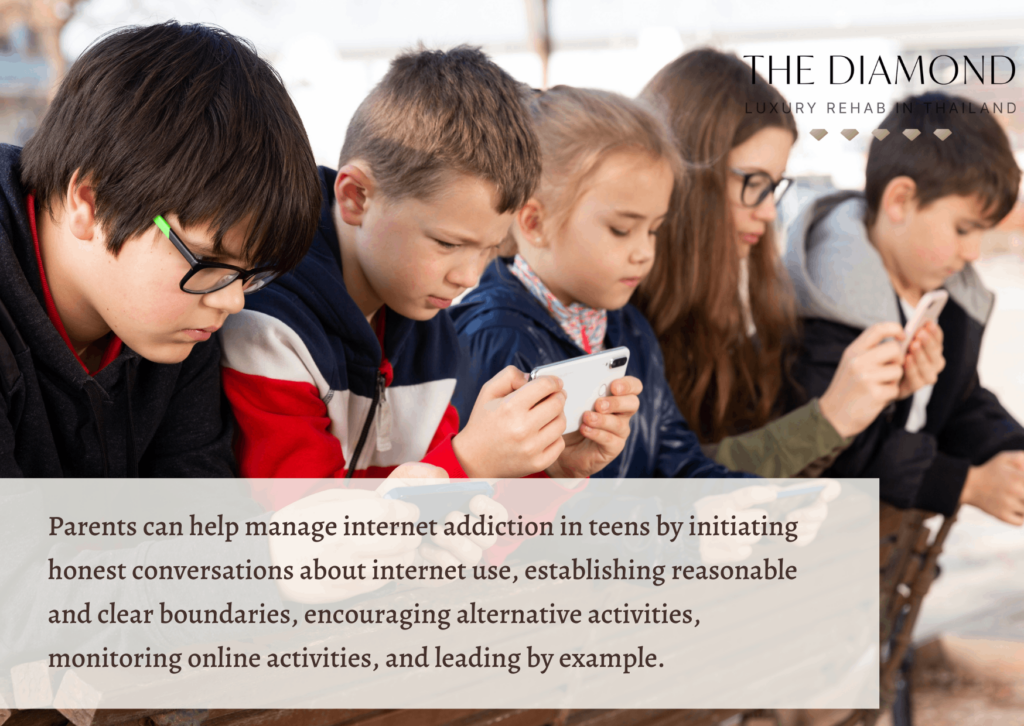
Parents can help manage internet addiction in teens by initiating honest conversations about internet use, establishing reasonable and clear boundaries, encouraging alternative activities, monitoring online activities, and leading by example.
Parents should talk to their teens about how they use the internet in an open and nonjudgmental way. Begin the dialogue by expressing your love and care for the well-being of your teen. Instead of using accusing language, focus on your observations and concerns about their internet use. You should also encourage your teen to share their opinions and experiences with the internet.
Setting reasonable and clear boundaries on screen time is also essential in avoiding excessive internet use. Establishing precise daily or weekly limitations on gadget usage, for example, especially during study or family time, might help achieve a healthy balance.
An article titled, “Internet Addiction Disorder – What Can Parents Do for Their Child?” from Webroot suggests working with your child in establishing these boundaries. It is also important to keep your guidelines and remember that you’re not attempting to control your child or change who they are. Instead, you’re helping them break an unhealthy habit.
Teens can avoid spending too much time in front of a screen by doing other activities and sports that get them moving, get them to talk to other people, and help them be creative. You can discuss your teen’s interests and activities with them. Encourage them to participate in activities that they are interested in, whether it be sports, arts and crafts, music, writing, or any other activity.
Monitoring online activities through parental control apps or built-in device features can help ensure compliance with set boundaries. These tools can be used to prevent access to inappropriate material, monitor usage, and filter out distracting ads.
It’s also critical to establish trust with your kid by explaining that monitoring isn’t about violating their privacy, but about ensuring their safety and helping them toward responsible internet use.
Finally, parents should also lead by example, modeling healthy internet behavior themselves. According to an article titled, “How to Talk to Your Teen About Social Media and Internet Use” from the Rocky Mountain Health Plans, children and parents frequently follow each other’s social media accounts, which means your teen can see anything you post online. This provides you with an excellent opportunity to model the type of conduct you anticipate.
What are the therapies used to overcome internet addiction in teens?
Different forms of therapies have been shown to be effective methods for the treatment of problematic internet use. The therapies used to overcome internet addiction in teens are listed below.
- Cognitive behavioral therapy (CBT): CBT is a popular therapy that helps kids recognize and change internet addiction-related negative thought patterns and behaviors. Teens can adjust to triggers that cause excessive internet use by challenging illogical ideas and learning healthy coping strategies.
- Family therapy: Internet addiction can have a negative impact on the overall family dynamic. Family therapy entails family members participating in order to address communication issues, create boundaries, and build support systems. It contributes to a healthy family atmosphere by encouraging ethical internet use.
- Interpersonal therapy (IPT): An article on treatment for internet addiction published in HealthyPlace.com states that internet addicts generally have interpersonal issues such as introversion or have insufficient social support systems in place, which is why they turn to virtual interactions to compensate for a lack of real-life social connection. IPT can help them address these underlying issues that lead to excessive internet use. IPT can also help a person enhance their social skills, communication skills, and assertiveness skills.
- Group therapy: Teens can share their experiences, learn from others, and be encouraged to limit their internet use in a safe and nonjudgmental setting through group therapy. It promotes a sense of belonging and assists teenagers in realizing they are not alone in their hardships.
- Motivational interviewing (MI): Teens can benefit from MI because it is client-centered and encourages them to examine what drives them to make changes. To help their patients overcome their internet addiction and find the internal drive to make positive changes, therapists use techniques like empathy and contemplation in MI.
How is internet addiction related to social media addiction?
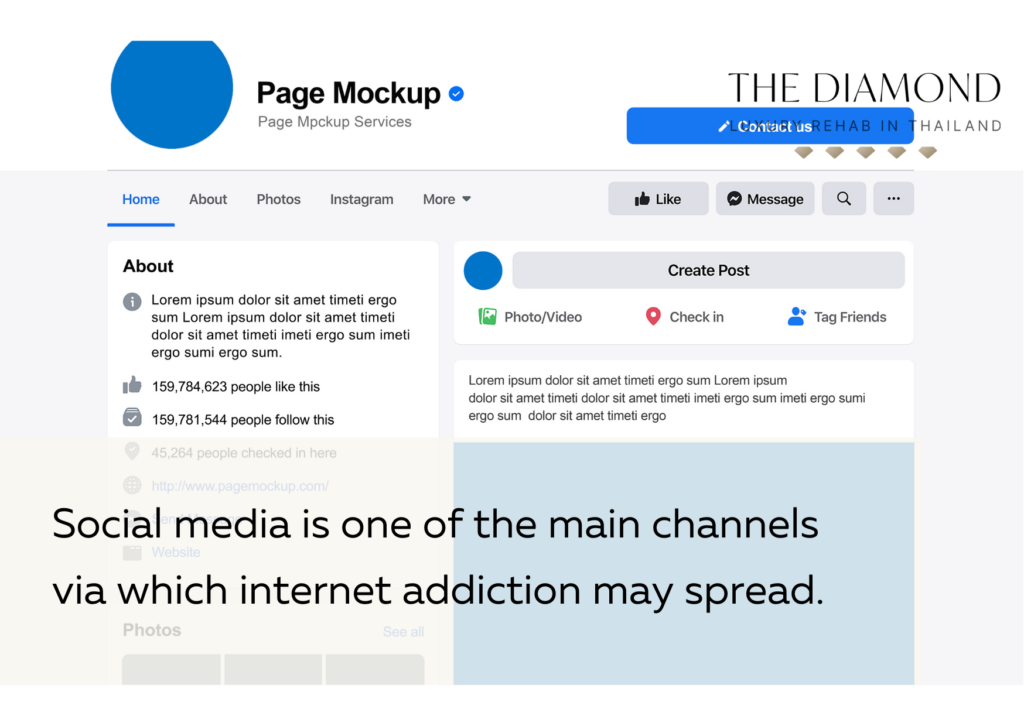
Internet addiction and social media addiction are closely related because the extensive use of the internet leads to social media addiction (SMA), according to a 2022 study on the relationship of social media addiction with internet use and perceived health published in Frontiers in Public Health.
According to studies, social media addiction is connected with greater use of electronic gadgets, cell phones, the internet, more sedentary time, worse sleep quality, and lower physical activity.
Social media is one of the main channels via which internet addiction may spread. Users can publish updates, photographs, and videos, as well as like, comment, and direct message others on social media networks.
Because social media platforms are always available on smartphones and other devices, it is easy for people to become unduly absorbed in them, leading to obsessive behaviors.
How is internet addiction related to Facebook addiction?
Facebook addiction is a behavioral condition that evolved from internet addiction, according to a 2017 article by Anindita Chakraborty, M.D. published in The American Journal of Psychiatry.
Findings from a 2022 online cross-sectional survey on the factors associated with Facebook addiction among university students amid the COVID-19 pandemic published in PLOS One states that researchers use the term “Facebook addiction” to characterize people who use Facebook excessively to the point where it interferes with their life.
Despite the fact that they may use Facebook to alter their mood, this behavior ultimately has a negative impact on their personal relationships and general wellbeing.
Is internet and Facebook addiction common among teens?
Yes, internet and Facebook addiction are common among teens, according to several studies. 45% of 13- to 17-year-olds are online almost constantly, and 97% use social media platforms such as YouTube, Facebook, Instagram, and Snapchat, according to a 2018 Pew Research Center survey of nearly 750 teenagers.
Furthermore, a 2017 article titled, “29 Social Networking Addiction Statistics” from BrandonGaille.com also stated that Facebook addiction syndrome affects an estimated 350 million social media users, and that it has been more prevalent among users aged 16 to 25.
Another 2019 study by Černjaet al., published in BMC Psychiatry revealed that 3.4% of high school students have a serious internet addiction. 39% had low-level online addiction, whereas 32% had moderate-level internet addiction.
Are there therapies for internet addiction?
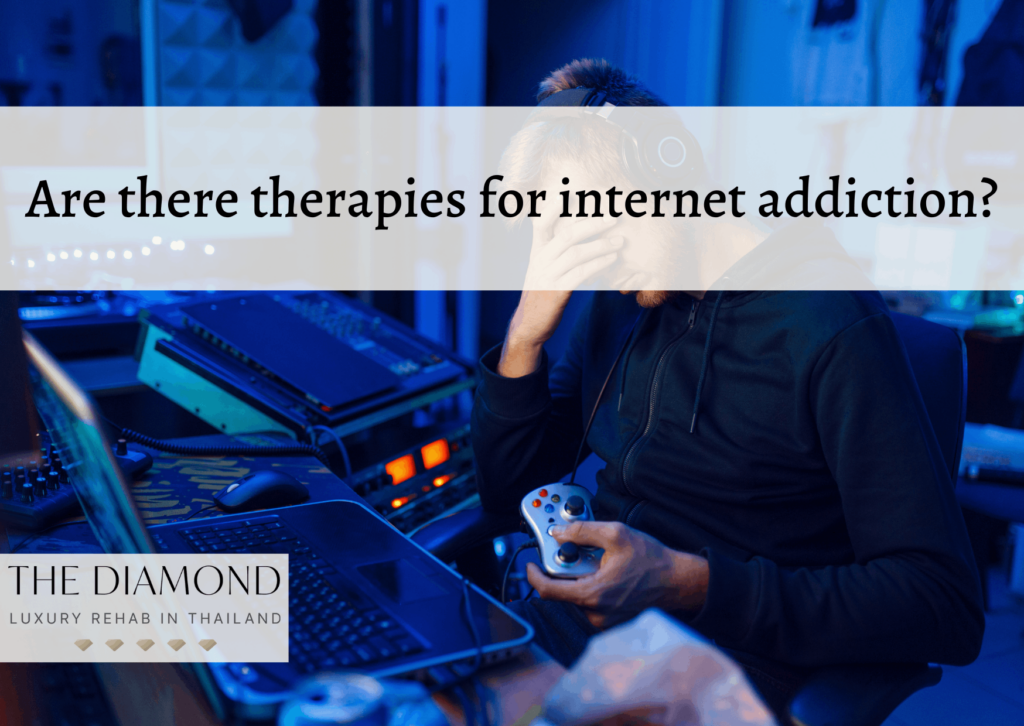
Yes, there are therapies for internet addiction, including cognitive behavioral therapy (CBT), family therapy, interpersonal therapy (IPT), group therapy, and motivational interviewing (MI).
Individuals can benefit from these therapy methods to overcome problematic internet use and create healthier online behaviors. The type of therapy chosen depends on the individual’s needs, interests, and the severity of their internet addiction.
If you or someone you know is battling with internet addiction, seeking professional help from a trained therapist or counselor can be effective in overcoming this condition.

